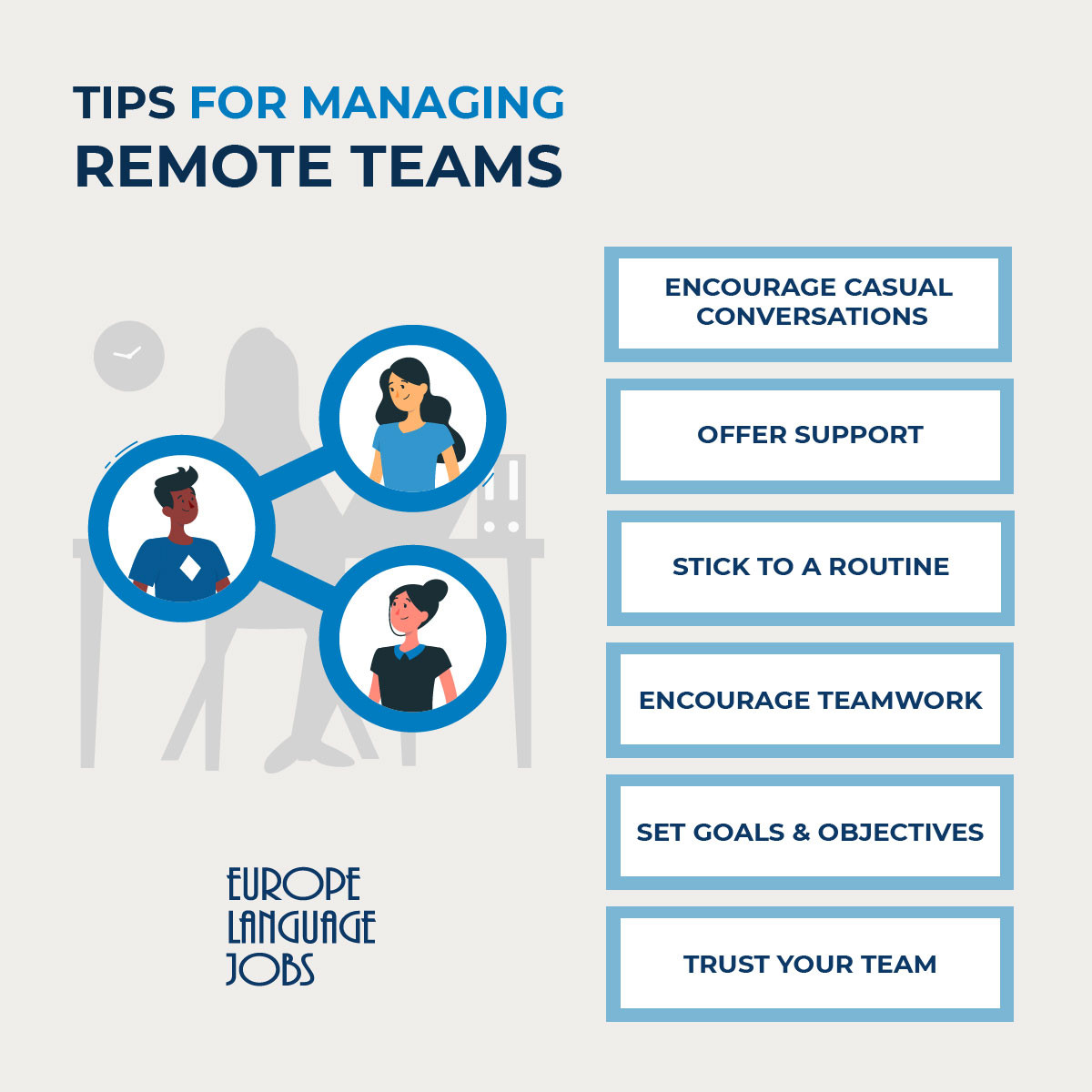7. Remote leadership: Strategies for inspiring and motivating remote teams
Source - (Learnow, 2022)
According to Professionalleadershipinstitute (2023), remote leadership is leading people working remotely towards a common goal or task. But it is more than that, as good remote leadership also inspires team members, drawing out the passion that results in quality work. Remote leadership requires managers and employers to be creative in how they connect with and lead their team of employees who are all in different locations.
According to M (2024), effective
strategies for remote leadership to inspire and motivate the virtual teams as
follows.
Clear communication
Communication is the cornerstone of any successful team, and
in a remote setting, it becomes even more critical. As a remote leader, it is
crucial to establish clear channels of communication. Utilize various tools
like video conferencing, instant messaging platforms and project management
software to keep the team connected. Regularly communicate goals, expectations
and provide feedback to ensure everyone is aligned and on the same page.
Build trust
Building trust is essential for any team, and in a remote
setup it takes on a new level of significance. Since remote leaders can't
physically observe the team members, it's vital to establish trust through
consistent and transparent communication. Encourage open dialogue, active
listening and empathy within the team. Trusting the team members' abilities
and providing them with autonomy fosters a sense of ownership and motivates
them to excel.
Set clear goals and
expectations
Remote teams need clarity on their objectives and
expectations to stay motivated and focused. Remote leaders should clearly
define goals, break them down into actionable steps and communicate them to the
team. Set realistic expectations and provide clear guidelines on deadlines,
deliverables and performance metrics. Further should regularly review progress
and provide constructive feedback to keep team on track and motivated.
Foster a sense of
belonging
One of the challenges of remote work is the potential for
isolation. As a leader, it is essential to create a sense of belonging and
camaraderie within the virtual team. Encourage team members to connect on a
personal level through virtual team-building activities such as virtual coffee
breaks, informal chats or online games. Celebrate milestones and achievements
together to foster a positive team culture and boost morale.
Encourage
collaboration
Collaboration is key to the success of any team. Remote leader needs to facilitate
collaboration among the team members. Need to encourage them to share ideas,
knowledge and best practices. Utilize collaborative tools and platforms that
enable real-time collaboration such as shared documents and virtual
whiteboards. Promote cross-functional collaboration and create opportunities
for virtual brainstorming sessions or team projects.
Provide support and
resources
Remote team members may face unique challenges and barriers
while working remotely. As a leader, it is essential to provide the necessary
support and resources to help them overcome these obstacles. Regularly check in
with team members, ask about their progress and inquire if they require any
assistance. Provide access to relevant training, tools and resources that
enable them to perform their tasks effectively. By demonstrating commitment to
their success as a remote leader, can inspire motivation and loyalty.
Recognize and
celebrate achievements
Remote team members often miss out on the immediate recognition and appreciation that comes with working in a physical office. As a remote leader, it is crucial to recognize and celebrate team's achievements. Acknowledge their hard work and accomplishments through public appreciation emails, virtual shout-outs in team meetings or even sending small tokens of appreciation. Celebrating successes boosts morale, fosters a positive team environment and motivates team members to excel further.
Lead by example
Remote leader’s actions speak louder than words. Lead by
example and demonstrate the qualities that expect from the team members.
Exhibit professionalism, punctuality and responsiveness in communication. Show
dedication to the work and maintain a positive attitude. Then the team members
will be inspired and motivated when they see their remote leader embodying the
values and positive behaviors.
Conclusion
In hybrid and remote workplaces, remote leaders play a major role by motivating remote employees. They are the persons who drive the employees towards to the common goal. For it these remote leaders have to use various strategies. Hence HRM will involve creating appropriate strategies to inspire and motivate remote employees. Motivated employees will maintain high employee engagement within the organization.
References
Europelanguagejobs. (2023). europelanguagejobs.
Retrieved from europelanguagejobs:
https://www.europelanguagejobs.com/blog/5-tips-to-manage-a-remote-team
Learnow. (2022, September 28). learnow. Retrieved
from learnow: https://www.learnow.live/blog/what-is-remote-leadership
M, R. (2024). remotepass. Retrieved from
remotepass:
https://www.remotepass.com/blog/remote-leadership-inspiring-and-motivating-your-virtual-team#:~:text=By%20focusing%20on%20clear%20communication%2C%20building%20trust%2C%20setting,your%20remote%20team%20to%20achieve%20their%20full%20potential.
Noondalton. (2022, March 16). 7 Tips for Motivating
Virtual Teams.
Professionalleadershipinstitute. (2023). professionalleadershipinstitute.
Retrieved from professionalleadershipinstitute:
https://professionalleadershipinstitute.com/resources/remote-leadership/


As the primary point of contact and support for remote teams, remote leaders must employ a variety of strategies to inspire and motivate their employees effectively. Correctly said.
ReplyDeleteyes, remote leadership requires a thoughtful and intentional approach to inspire and motivate the virtual team. successful remote leadership is all about connecting with team members, despite the physical distance, and empowering them to thrive in a virtual work setting (M,2024).
DeleteThis article is a valuable resource for any leader navigating the challenges of remote work. The practical strategies offered are not just theoretical but are essential for building a cohesive, motivated, and engaged remote team. A must-read for leaders looking to adapt and thrive in the digital workplace
ReplyDeletethank you! good remote leadership also inspires team members, drawing out the passion that results in quality work. A solid leader stays calm under pressure, surrounding themselves with good people, even if it’s remotely (Professionalleadershipinstitute,2023).
DeleteRemote leadership presents unique challenges in inspiring and motivating teams, but with the right strategies, leaders can foster engagement and drive success in remote work environments.
ReplyDeleteyes, by embracing a remote leadership mindset, leveraging technology tools, fostering connection and collaboration, promoting trust and accountability, encouraging autonomy and empowerment, and prioritizing well-being, leaders can effectively lead and motivate virtual teams (Golhar,2023).
Deletegood article about leadership engagement in remote work environment also we can look at the key aspects include ensuring secure video conferencing, monitoring team progress, consolidating content and communications, engaging employees, and supporting their physical and mental well-being to sustain productivity and company culture in a remote work setting.
ReplyDeleteAs organizations embrace remote work arrangements, leaders face the unique challenge of leading and motivating virtual teams. Effective leadership in a remote work era requires adapting traditional leadership practices to the virtual environment, leveraging technology, fostering connection and collaboration, promoting trust and accountability, and empowering team members (Golhar,2023).
DeleteWhen it comes to common goals yes leaders play a major role by motivating remote employees.. engagement is very important
ReplyDeleteRemote teams need clarity on their objectives and expectations to stay motivated and focused. Clearly define goals, break them down into actionable steps, and communicate them to team. Regularly review progress and provide constructive feedback to keep team on track and motivated should be done by remote leaders (M,2024).
DeleteThis article offers an insightful look at effective remote leadership strategies, emphasizing the importance of clear communication, trust-building, and fostering a sense of belonging among remote teams. It’s a valuable guide for any leader navigating the nuances of inspiring and motivating teams in a virtual environment. Truly a must-read for remote leaders looking to elevate their team's performance and engagement.
ReplyDeleteyes, leaders must adopt a remote leadership mindset, recognizing the distinct characteristics and challenges of leading virtual teams. This involves understanding the importance of clear communication, establishing trust remotely, and acknowledging the diverse needs and circumstances of team members (Golhar,2023).
DeleteYour piece on remote leadership offers practical and thoughtful strategies that resonate well with the needs of modern remote teams. The emphasis on trust, clear communication, and recognition is particularly impactful. Your approach not only showcases a deep understanding of remote work dynamics but also serves as a valuable resource for leaders looking to inspire and motivate their teams effectively.
ReplyDeleteCommunication is the cornerstone of any successful team, and in a remote setting, it becomes even more critical. As a remote leader, it is crucial to establish clear channels of communication. Utilize various tools like video conferencing, instant messaging platforms, and project management software to keep team connected (M,2024).
DeleteThank you for sharing practical strategies for remote leadership, highlighting the importance of inspiring and motivating remote teams towards common goals. It emphasizes clear communication, trust-building, goal-setting, fostering belonging, encouraging collaboration, providing support, recognizing achievements, and leading by example. With a focus on HR involvement in creating effective strategies, it equips leaders with actionable guidance to drive employee engagement and success in remote work environments. I believe we can include some insights on the importance of flexibility and adaptability in remote leadership. Remote leaders need to be agile and responsive to changing circumstances, especially in dynamic work environments. They should be open to feedback from team members and willing to adjust their approach accordingly.
ReplyDeleteabsolutely 100% agree with your suggestion, they should. Creating a sense of connection and fostering collaboration is crucial for virtual teams to share their ideas. Leaders can organize virtual team-building activities, encourage open dialogue, and provide opportunities for social interaction to build rapport and strengthen relationships among team members (Golhar,2023).
DeleteRemote leadership requires strategies that inspire and motivate remote teams effectively. By implementing these strategies, remote leaders can empower their teams, build trust, and drive success even in virtual work environments. Good stuff.
ReplyDeletethank you! correctly said. successful remote leadership is all about connecting with your team members, despite the physical distance, and empowering them to thrive in a virtual work setting (M,2024).
DeleteInformative article on remote leadership which is common nowadays. There are similarities with regular leadership styles also. but remote leaders must adopt these strategies more than ever due to their working environments.
ReplyDelete